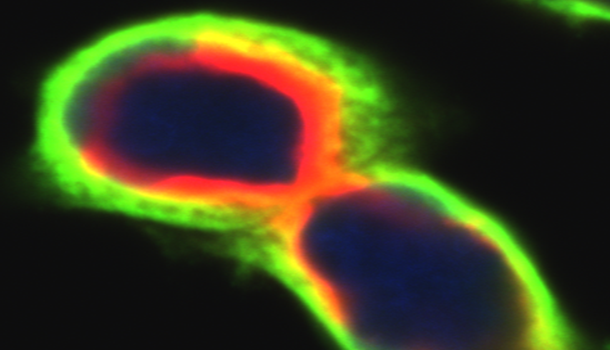
Imaging proteins on live cells. Image provided by Yong Wang.
NSF award to shine more light on proteins
8/6/2018
UNIVERSITY PARK, Pa. — An award from the National Science Foundation (NSF) will enable a Penn State researcher to develop a better method to “see” proteins for improved medical diagnoses.
Yong Wang, professor of biomedical engineering, received a three-year, $318,696 award from the NSF to develop a technology that will more easily and accurately visualize trace biomarker proteins under a microscope.
“An NSF award is different from an actual grant from other funding agencies due to the dual purposes,” Wang said. “It is not only the job of scientists to do research but also to help the public, including students of all age levels, become familiar with what's going on in science and engineering.”
The research aspect of the award will focus on the importance of protein examination to most biomedical science fields and clinical diagnostics because many important proteins are difficult to detect due to their low concentrations.
“Seeing means truth, but how can you see proteins with a very low amount?” Wang said. “You have to amplify the signal of target proteins, otherwise you cannot clearly see them at all.”
Traditionally, one protein would be displayed by a few light-emitting molecules, Wang said. But the method he is seeking to develop is a novel biosensing nanotechnology that would enable proteins to be displayed by 100, or even more, light-emitting molecules.
“Right now, it’s like we have a dark room lit by one small bulb, in one area you can see, but for the overall area, it's still dark,” Wang said. “If you have 100 bulbs, it's like day, you can see everything.”
This method would greatly advance protein sensing, with several real-world benefits, including the improvement of clinical diagnoses that are based on biopsies.
“If a physician thinks a patient may have cancer, they take a small piece of tissue as biopsy,” Wang said. “The problem is the sample is very small, sometimes too small. If we can amplify the protein signal, this small piece of tissue is like a bigger piece for accurate diagnosis, so it's easier for physicians as far as diagnostics."
Beyond clinical diagnostics, Wang’s research holds great potential to immediately help basic biomedical and biological research areas that require sensitive protein imaging and detection. This technology can also be tuned for the development of other biosensing methods and materials. Wang and his co-workers have already submitted a patent application for this technology. Now Wang and Penn State Office of Technology Management are actively looking for the opportunity of licensing this innovative technology.
As part of the award, Wang said he will actively recruit students including underrepresented populations at different academic levels. Thus, the societal impact from Wang’s work on the award will be broader. “If I encourage 10 young students to be scientists in the future, then they educate 10 more scientists, then you have 100 new scientists,” Wang said. “That's why we will try to educate students on different levels. Not only our undergrads, grad students, but also high school students.”
The knowledge generated from this program will be integrated into undergraduate and graduate courses, and the findings will be widely publicized through high-profile journals and conference presentations.
Along with this NSF award, Wang recently received a $2 Million grant from NIH for developing a protein-releasing artificial skin for the treatment of chronic wounds. These awards will help Wang’s lab, Biomolecular and Biomimetic Materials Laboratory, to develop novel technologies for protein delivery and imaging.




